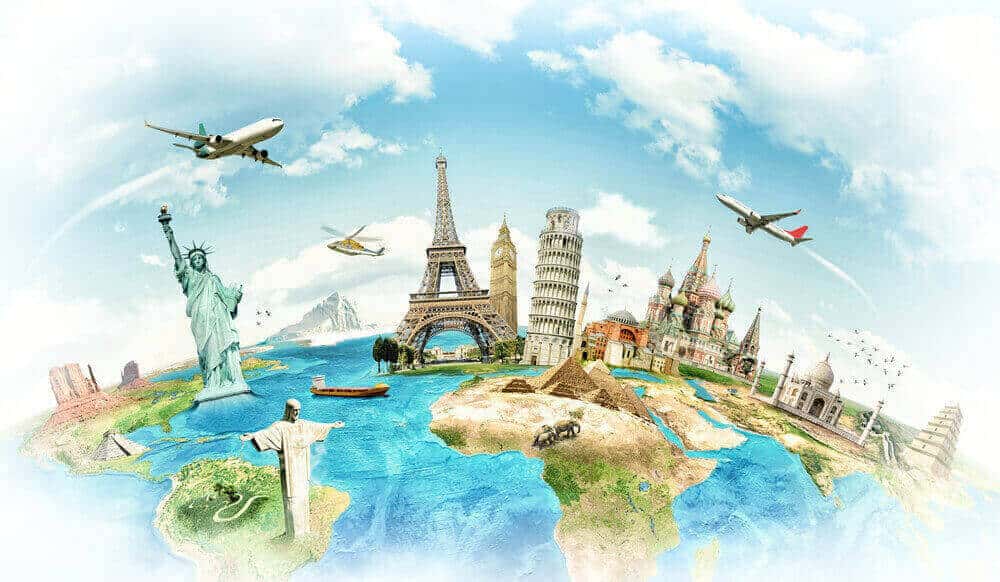What motivates you to travel? Is it the quest for adventure, the desire to immerse yourself in different cultures, or do you need to take a break from your mundane routine? Your travel motivations play a crucial role in shaping your travel experience.
Determine Your Travel Motivation
Determining travel motivations is an important step to explore before booking your next trip. There are several factors to consider, including your passions and personal interests, family, adventure, leisure and social interests, self discovery and spirituality, the desire to experience something new, your cultural and traditional wants, as well as your beliefs about sustainability and the environment, previous experience, and your budget and time frame.
Passions and Personal Interests: Identifying your passions and interests is vital. Do you enjoy historical sites, nature activities, or culinary experiences? Or do you like relaxation and wellness travel, focusing on physical, mental, and emotional well being with activities like yoga or golf?
Do you enjoy learning about different cultures and gaining knowledge, or are you looking to create lasting social connections with other travellers? Answer these questions and make a list to help you discover your travel motivation. Our guide What Healthy Leisure Activities Can Do For You can also help you identify your passions and personal interests.
Family: Do you prefer to travel solo, with family, with friends or in a group knowing this is essential to create a more enjoyable experience. Travelling with loved ones is a great way to deepen relationships and create lasting memories.
Adventure: For adventure travellers, it’s the desire for adventure or exploration, pushing oneself to do heart-thumping things in beautiful parts of the world. Key motivations include seeking new experiences, pushing personal boundaries, and learning new skills. In addition, adventure travellers are drawn to remote or challenging destinations that offer unique growth opportunities.
A sense of personal achievement drives adventure travellers to be willing to take risks to reach their goals, encouraging them to step out of their comfort zone. This type of travel is about pushing boundaries and taking risks, whether hiking to the top of a mountain, bungee jumping, zip lining or trying an extreme sport for the first time.
Social and Leisure: Leisure travel focuses on relaxation and enjoyment. Travellers may seek a relaxing vacation away from home. Social and leisure travel motivations include the desire to meet new people, experience different cultures, explore new places, and relax in a new environment.
These trips provide a chance to explore new cultures and participate in activities such as sightseeing, shopping, and attending events that can all be part of social and leisure travel. Whether spending time with loved ones or simply taking time for yourself, social and leisure travel can be a fulfilling and rewarding experience.
Self Discovery and Spiritual: Self discovery and personal growth are motivations for travel. For those interested in deepening their connection to their spirituality, a spiritual trip will focus on practices like meditation, prayer or other spiritual activities.
Newness: A new idea inspires many, or an impromptu trip can provide thrills and inspirational stories. Some travellers seek to discover new places, and many travellers find solace in escapism- escaping their everyday lives and learning something new.
Cultural and Traditional: This type of travel can be challenging as it requires an openness to unfamiliar ways of life and cultures, but the reward is gaining insight into how people from different backgrounds live and think. Cultural and traditional travel motivations include visiting historical sites, attending festivals, and exploring local cuisine.
Another important aspect of cultural and traditional travel is eco-tourism, which emphasizes responsible travel by supporting local communities and preserving the planet’s natural resources. Whether you’re interested in exploring different cultures, learning new languages, tasting different cuisines, or engaging in various customs, cultural and traditional travel offers a rich and rewarding experience.
Environmental And Sustainability: When it comes to travel motivations, environmental and sustainability-focused travel is a growing trend. These travellers are conscious of their environmental footprint. Moreover, they actively look for ways to reduce it while on the go, which might mean choosing eco-friendly lodging and transportation, volunteering with conservation organizations, or selecting destinations prioritizing sustainable tourism practices.
To practice sustainable travel, start by educating yourself about the destination, which includes learning about local ecosystems, local initiatives, and efforts to promote sustainability. This type of travel can benefit those passionate about preserving the environment. It allows them to support eco-friendly initiatives and reduce their carbon footprint while exploring the world.
Previous Experience: Analyzing past trips and understanding what motivated you to go can also provide insight into future travel plans. Planning a trip based on your previous experience and current motivation can help you make the most of your travel experience. For example, a self-guided tour is a good option if you are looking for flexibility and independence, and if you want a sense of adventure, impromptu trips may be more of your style.
Budget and Time Frame: Several costs, including airlines, transport, tourist attractions, hotels, and food, must be considered to meet your budget.
Luxury travel features fancy accommodations, chauffeurs, and fine dining, while budget travel is about experiencing local destinations’ cultures and cuisines. Luxury travel is perfect for those seeking more of a relaxed and luxurious experience with all the amenities that come with it.
Luxury travel offers a high level of comfort and convenience but can also be expensive and less immersive than other types of travel. On the other hand, budget travel is an affordable way to explore the world with fewer amenities. Each type of travel has pros and cons, so it’s essential to identify what motivates you and what you value in travel experiences before embarking on your journey.
If you want to plan a trip based on your travel motivations but don’t have a big budget, there are still plenty of options available. One of the first things to consider is alternative forms of accommodation such as couchsurfing, Airbnb, hostels, or camping, as hotels also vary from budget to luxury and from all-inclusive resorts to boutique hotels.
Another way to save money is by taking advantage of discounts, coupons and deals offered by airlines, hotels, tour operators, and other travel companies. You can also explore virtual tours of museums and cultural sites, watch documentaries about distant places, or use online language learning tools as an alternative.
Consider using public transportation to save on taxi and rental car fees. In addition, packing light and eating at local restaurants can help you save money, as can researching free activities and attractions in the area you plan to visit.
The most popular motivations for travel include adventure, learning, relaxation, and exploration. Based on your review of what motivates you to travel, you may have one or two of the same motivations for travelling.
Ultimately, the goal is to choose a travel experience that brings joy and satisfaction. Whatever your travel motivation, discovering it can lead to more fulfilling and exciting travel experiences. So, take the time to ask yourself what kind of travel experience would make you happiest, and plan accordingly.
How Travel Motivations Affect Travel Companion Dynamics
Understanding your travel motivations can significantly impact your travel companion dynamics when planning a trip. For example, adventure seekers may be more interested in unique and thrilling experiences, while relaxation seekers may prefer leisure activities. Likewise, social travellers might choose to plan their trip with close friends or family, while solo travellers prefer a more independent experience. So it is essential to find people with similar interests and attitudes toward travel if you are looking for a rewarding experience.
Also, consider how the travel experiences affect your companions or group dynamics. For example, if you plan a solo trip, it’s important to consider how comfortable you will feel travelling alone in an unfamiliar place.
Benefits Of Planning A Trip Based On Your Travel Motivation
Understanding your travel motivations can be vital in planning your perfect trip. You can tailor your trips to maximize your experience by identifying what type of traveller you are, which will assist in choosing suitable destinations, activities, travel buddies and even accommodations that align with your goals.
Furthermore, understanding your travel motivations will help you save money by avoiding activities and destinations that don’t appeal to you. For example, if culture is your focus, you may want to spend more on restaurant meals and less on expensive tourist traps.
Knowing your motivations can also help you plan an appropriate itinerary. So, if you are looking for relaxation, choose a destination known for its spa offerings. If you’re an adventurer, you may consider destinations offering watersport activities, hiking trails, or other exciting experiences.
Knowing your travel motivations and tailoring your trips can create a memorable and fulfilling experience.
Tips For Planning Based On Travel Motivations
- Before planning a trip, identify the type of travel that interests you the most.
- Consider the best time to go based on the activities or experiences you’d like to have.
- Set a budget and research destinations that fit your financial goals.
- Research destinations that best suit your travel motivations.
- Travel with people with similar motivations.
- Factor in time for rest and relaxation during your trip, as this will help you recharge your batteries and make the most of your adventure.
With these tips, you can plan a trip that aligns with your travel intentions and makes your journey memorable.
How can I balance my desire for relaxation with my passion for adventure during my travels?
When planning your trip, look for options that mix active activities with relaxation; seek a balance between physical activity and relaxation. This way, you can satisfy your desire for adventure while also taking time to unwind and recharge.
What are the advantages of travelling in a group?
Group travel offers several advantages, including companionship and sharing experiences with others. While solo travel can be liberating, group travel offers less pressure and more support. In addition, group travel can increase safety and security and be an opportunity to meet new people and make lasting friendships.
Are there any common misconceptions about specific types of travel?
Yes, many, for example, solo travel is often associated with loneliness, but many travellers find it to be a rewarding and empowering experience. Similarly, luxury travel is often viewed as expensive and unattainable, but there are ways to experience luxury on a budget.
Final Thoughts
There are various types of travellers, and it’s essential to identify your travel motivations to enhance your overall travel experience and make the most of your time and budget.
When identifying your travel motivations, consider what you enjoy most about travelling. Knowing your motivations can help you choose the right destinations and activities that align with your goals.






